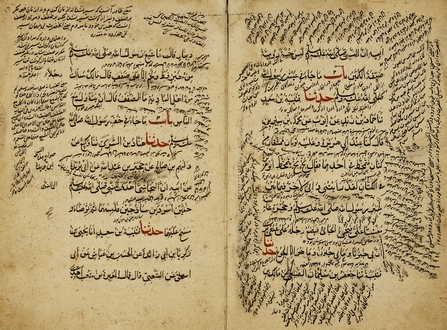Hadith
Hadith, meaning literally “narrative” or “talk,” is the name for the traditional accounts of the Prophet Muhammad’s words and deeds, and his reactions to the behavior and statements of others. Hadith is second only to the Quran as a source for jurisprudence, ritual, theology, and other areas of Islamic life. Hadith assumed this role as a comprehensive body of tradition, and as a defined discipline of study, over the course of generations.
As the Islamic empire expanded following the Prophet Muhammad’s death in 632, the companions (ṣaḥāba) of the Prophet recounted stories of his life to each other and to the large number of new converts to the religion. Facing new ritual and other problems that could not be resolved by reference to the Quran alone, Muslims turned to these traditions as a source of authority, looking to find in the Prophet’s words and deeds guidance in all spheres of life, from diet to politics. This led to an exponential growth in the number of traditions, many of which were suspected of being inauthentic. An elaborate science of hadith developed in response. Scholars worked to identify reliable transmitters and traditions, and to set aside those deemed untrustworthy.
By the early ninth century, hadith had assumed the form we know it today. The text (matn) of the hadith is accompanied by a chain of tradition (isnād), naming each transmitter back to the individual who him- or herself saw or heard the Prophet. Over the course of that century, the first written collections of hadith, arranged by subject, were compiled. Of these, six became the most authoritative among Sunni Muslims: those by al-Bukhārī (810-870), Muslim (d. 875), Abū Dā’ūd (d. 889), al-Tirmidhī (824-892), al-Nasāʾī (829-915), and Ibn Māja (d. 886). These books are revered by the Sunnis. The Shi'is developed a parallel Hadith tradition, which relies on other sources, due to Shi'ite hostile attitude to many of the Prophet's companions.
The oral nature of hadith transmission placed great importance on hearing the tradition directly from authoritative teachers, and through the most reliable chains of transmission. Indeed, this was one of the primary motivations for the many scholars who embarked on quests in pursuit of knowledge across regions and continents, creating in the process dynamic networks connecting Muslim communities from Spain to Central Asia.
In the Library collection you can find a rich and diverse corpus of digitized hadith manuscripts, from magnificent canonical collections, produced for royal libraries;, to locally produced "notebooks," which were used for the practical study and documentation of traditions. The Library also holds a vast collection of scholarly research on the topic.

